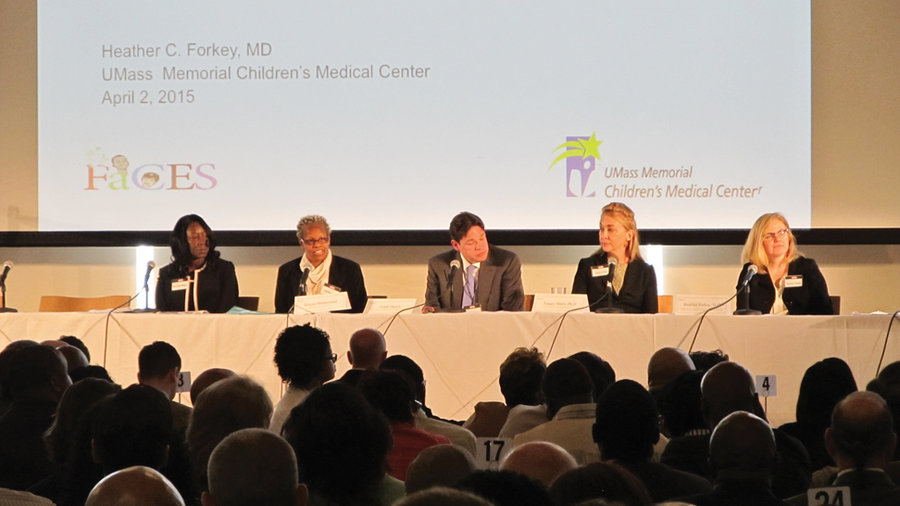Saying that special interests and profit-making corporations that provide services to jails are getting in the way of prison reform, former New York Times reporter Christopher Hedges, keynote speaker for the Second Annual Prisoner Conference held at St. Peter’s University on April 2, said it may be time for protest – perhaps even civil disobedience.
Hedges, the son of a Presbyterian minister, earned a Masters of Divinity degree from Harvard and an honorary doctorate from Starr King School for the Ministry in Berkeley, Calif. before spending nearly two decades as a foreign correspondent in Central America, the Middle East, Africa and the Balkans. He was an early and outspoken critic of the US plan to invade and occupy Iraq and became a critic of press coverage that seemed to cheerlead for the war effort.
In 2002, he was part of a team of reporters for The New York Times who won a Pulitzer Prize for the paper’s coverage of global terrorism. That same year he won an Amnesty International Global Award for Human Rights Journalism. Hedges’ is the author of the 2002 best seller, “War is A Force That Gives Us Meaning,” an examination of what war does to individuals and societies.
He has authored other books on war, but turned to his attention to prisoner reform when he learned about conditions that convicts face.
Legislative action might not be enough
Speaking before a room filled with local, state and regional leaders, Hedges said reform of the prison system that will allow ex-offenders to return to society cannot be left in legislative hands, noting that supplying convicts to the current penal system has become big business.
He said the costs associated with prison life combined with low wages for work done and fines imposed often leave prisoners deeply in debt when they leave prison, additional challenges when they try to make a living.
Companies supplying food services, phone cards and other items commonly used by prisoners have a virtual monopoly in prisons, and are powerful lobbyists against reforming the system.
“Corporate lobbyists write legislation,” he said, “and we have all sorts of corporate entities that have a vested interest in keeping the current system going because they make a lot of money off of it, whether it is from private prisons to phone card companies. I think we have to make our voices heard. I think there are all sorts of issues around fair pay in prison.”
“I think we have to get out on the street … and have our voices heard.” – Christopher Hedges
____________
“These people have to get out and have a financial and physical structure in place, which I knew the governor [Christopher Christie] is working on where they can reenter,” he said. “One of my students is getting out and will be sleeping on his sister’s couch. That will get old really fast for him and his sister. There is so much stacked against him. Trusting naively in the legislative process to reform itself at this point isn’t going to work. I think we have to get out on the street … and have our voices heard. It calls for the same kind of mass organization and even acts of civil disobedience that will begin to put pressure on the system.”
Jobs are key to keeping people from returning to jail
The Second Annual Prisoner Conference brought together many of the key players in the prisoner reentry and prison reform movement.
The all-day event presented a number of panels of experts to explore a variety of issues on how ex-offenders transition back into society after being incarcerated.
This year, these panels focused in on three critical areas – conditions growing up that set people on a path towards prison, what happens inside prison, and what they can expect when they get out.
Jersey City’s director of Workforce Development, former Gov. Jim McGreevey, helped organize the conference, and is partly credited with some of the successful transition of prisoners – especially through his work with Integrity House – which has established drug treatment and reentry programs at the Hudson County Correctional Facility. Some of the Jersey City efforts have reduced the rate of prisoners returning to jail within three years of their release from 70 percent to less than 25 percent.
An overwhelming percentage of ex-offenders have substance abuse issues, so treatment is essential to maintain their sobriety, McGreevey said.
Treatment, housing, training and employment are key to keeping ex-offenders from going back to jail, McGreevey said when establishing the conference last year.
“A full two-third of ex-offenders commit a felony within three years of release,” McGreevey said. “Having a job is an essential cornerstone for financial independence and personal dignity.”
The conference brought together leaders in the city, state and county, as well as recovering ex-offenders. But the audience was packed with leaders of the community who had come to learn and support the efforts, since many represent areas of Hudson County that are most impacted by the surge in crime.
City Council members, county freeholders, religious leaders, and business people filled the college hall to listen to experts talk about impact of prison and proposed solutions. Some of the more notable guests included criminal defense attorney Joseph Hayden, US Attorney for New Jersey Paul J. Fishman, and former heavyweight champion boxer, Mike Tyson.
The conference also fulfills a pledge by Mayor Fulop to assist with the integration of ex-offenders by expanding the Jersey City Employment and Training program’s mission to provide an array of reentry services.
The program in 2014 provided services to 375 men and women. Of the total number of formerly incarcerated people who enrolled in the first six months of the program, 61 percent found jobs. Last year, the city opened Martin’s Place on Martin Luther King Drive as a reentry center with training programs connected to local unions and the Jersey City Medical Center.
Al Sullivan may be reached at asullivan@hudsonreporter.com.
